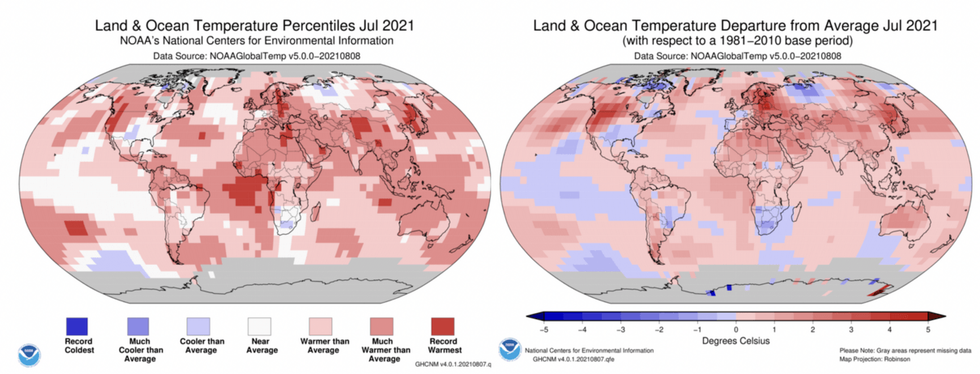

SUBSCRIBE TO OUR FREE NEWSLETTER
Daily news & progressive opinion—funded by the people, not the corporations—delivered straight to your inbox.
5
#000000
#FFFFFF
To donate by check, phone, or other method, see our More Ways to Give page.


Daily news & progressive opinion—funded by the people, not the corporations—delivered straight to your inbox.

A deer wanders in heavy smoke in front of a row of burned cars amid the Dixie fire in Greenville, California on August 6, 2021. (Photo: Josh Edelson/AFP via Getty Images)
The National Oceanic and Atmospheric Administration said Friday that July 2021 was the hottest month ever recorded on Earth, a finding that comes just days after a United Nations scientific panel warned that humanity is running out of time to prevent the worst consequences of the climate emergency.
"This new record adds to the disturbing and disruptive path that climate change has set for the globe."
--Rick Spinrad, National Oceanic and Atmospheric Administration
"All of the sirens are going off," Rep. Don Beyer (D-Va.) tweeted in response to NOAA's announcement. "It is wildly important that Congress take strong, comprehensive action as soon as possible to meet the threat of climate change."
In a press release, NOAA's National Centers for Environmental Information noted that with the inclusion of data from last month--which was marked by devastating wildfires across the globe, from California to Turkey to Siberia to Canada--"it remains very likely that 2021 will rank among the world's 10 warmest years on record."
"In this case, first place is the worst place to be," NOAA Administrator Rick Spinrad said in a statement. "July is typically the world's warmest month of the year, but July 2021 outdid itself as the hottest July and month ever recorded. This new record adds to the disturbing and disruptive path that climate change has set for the globe."

Based on records dating back to 1880, NOAA's new analysis finds that the combined land and ocean surface temperature in July 2021 was 1.67degF higher than the 20th century average of 60.4degF. Last month's global surface temperature was just slightly higher than that of July 2016, a temperature that was tied in both 2019 and 2020.
"During the month, temperatures were much warmer than average across parts of North America, Europe, northern and southern South America, northern Africa, the southern half of Asia, Oceania, and parts of the western and northern Pacific, Atlantic, and Indian Oceans," the U.S. government agency found.
In just the Northern Hemisphere, the land-surface temperature last month was the highest ever recorded in July--an "unprecedented" 2.77degF above the 20th century average.
"The seven warmest Julys have all occurred since 2015," NOAA observed. "July 2021 marked the 45th consecutive July and the 439th consecutive month with temperatures, at least nominally, above the 20th-century average. Climatologically, July is the warmest month of the year. With July 2021 the warmest July on record, at least nominally, this resulted in the warmest month on record for the globe."
NOAA's findings align with the Intergovernmental Panel on Climate Change's warning on Monday that the planet's temperature is rising at an "unprecedented" rate--a trend the U.N. body said can only be reversed by massive and rapid reductions in greenhouse gas emissions caused primarily by the burning of fossil fuels.
"This is not the new normal," the climate advocacy group Friends of the Earth tweeted in response to NOAA's findings. "Extreme temperatures and deadly weather will only get worse if we continue business-as-usual. Meanwhile, every year our government is still throwing billions of tax dollars into the corporations fueling this climate crisis."
Dear Common Dreams reader, The U.S. is on a fast track to authoritarianism like nothing I've ever seen. Meanwhile, corporate news outlets are utterly capitulating to Trump, twisting their coverage to avoid drawing his ire while lining up to stuff cash in his pockets. That's why I believe that Common Dreams is doing the best and most consequential reporting that we've ever done. Our small but mighty team is a progressive reporting powerhouse, covering the news every day that the corporate media never will. Our mission has always been simple: To inform. To inspire. And to ignite change for the common good. Now here's the key piece that I want all our readers to understand: None of this would be possible without your financial support. That's not just some fundraising cliche. It's the absolute and literal truth. We don't accept corporate advertising and never will. We don't have a paywall because we don't think people should be blocked from critical news based on their ability to pay. Everything we do is funded by the donations of readers like you. Will you donate now to help power the nonprofit, independent reporting of Common Dreams? Thank you for being a vital member of our community. Together, we can keep independent journalism alive when it’s needed most. - Craig Brown, Co-founder |
The National Oceanic and Atmospheric Administration said Friday that July 2021 was the hottest month ever recorded on Earth, a finding that comes just days after a United Nations scientific panel warned that humanity is running out of time to prevent the worst consequences of the climate emergency.
"This new record adds to the disturbing and disruptive path that climate change has set for the globe."
--Rick Spinrad, National Oceanic and Atmospheric Administration
"All of the sirens are going off," Rep. Don Beyer (D-Va.) tweeted in response to NOAA's announcement. "It is wildly important that Congress take strong, comprehensive action as soon as possible to meet the threat of climate change."
In a press release, NOAA's National Centers for Environmental Information noted that with the inclusion of data from last month--which was marked by devastating wildfires across the globe, from California to Turkey to Siberia to Canada--"it remains very likely that 2021 will rank among the world's 10 warmest years on record."
"In this case, first place is the worst place to be," NOAA Administrator Rick Spinrad said in a statement. "July is typically the world's warmest month of the year, but July 2021 outdid itself as the hottest July and month ever recorded. This new record adds to the disturbing and disruptive path that climate change has set for the globe."

Based on records dating back to 1880, NOAA's new analysis finds that the combined land and ocean surface temperature in July 2021 was 1.67degF higher than the 20th century average of 60.4degF. Last month's global surface temperature was just slightly higher than that of July 2016, a temperature that was tied in both 2019 and 2020.
"During the month, temperatures were much warmer than average across parts of North America, Europe, northern and southern South America, northern Africa, the southern half of Asia, Oceania, and parts of the western and northern Pacific, Atlantic, and Indian Oceans," the U.S. government agency found.
In just the Northern Hemisphere, the land-surface temperature last month was the highest ever recorded in July--an "unprecedented" 2.77degF above the 20th century average.
"The seven warmest Julys have all occurred since 2015," NOAA observed. "July 2021 marked the 45th consecutive July and the 439th consecutive month with temperatures, at least nominally, above the 20th-century average. Climatologically, July is the warmest month of the year. With July 2021 the warmest July on record, at least nominally, this resulted in the warmest month on record for the globe."
NOAA's findings align with the Intergovernmental Panel on Climate Change's warning on Monday that the planet's temperature is rising at an "unprecedented" rate--a trend the U.N. body said can only be reversed by massive and rapid reductions in greenhouse gas emissions caused primarily by the burning of fossil fuels.
"This is not the new normal," the climate advocacy group Friends of the Earth tweeted in response to NOAA's findings. "Extreme temperatures and deadly weather will only get worse if we continue business-as-usual. Meanwhile, every year our government is still throwing billions of tax dollars into the corporations fueling this climate crisis."
The National Oceanic and Atmospheric Administration said Friday that July 2021 was the hottest month ever recorded on Earth, a finding that comes just days after a United Nations scientific panel warned that humanity is running out of time to prevent the worst consequences of the climate emergency.
"This new record adds to the disturbing and disruptive path that climate change has set for the globe."
--Rick Spinrad, National Oceanic and Atmospheric Administration
"All of the sirens are going off," Rep. Don Beyer (D-Va.) tweeted in response to NOAA's announcement. "It is wildly important that Congress take strong, comprehensive action as soon as possible to meet the threat of climate change."
In a press release, NOAA's National Centers for Environmental Information noted that with the inclusion of data from last month--which was marked by devastating wildfires across the globe, from California to Turkey to Siberia to Canada--"it remains very likely that 2021 will rank among the world's 10 warmest years on record."
"In this case, first place is the worst place to be," NOAA Administrator Rick Spinrad said in a statement. "July is typically the world's warmest month of the year, but July 2021 outdid itself as the hottest July and month ever recorded. This new record adds to the disturbing and disruptive path that climate change has set for the globe."

Based on records dating back to 1880, NOAA's new analysis finds that the combined land and ocean surface temperature in July 2021 was 1.67degF higher than the 20th century average of 60.4degF. Last month's global surface temperature was just slightly higher than that of July 2016, a temperature that was tied in both 2019 and 2020.
"During the month, temperatures were much warmer than average across parts of North America, Europe, northern and southern South America, northern Africa, the southern half of Asia, Oceania, and parts of the western and northern Pacific, Atlantic, and Indian Oceans," the U.S. government agency found.
In just the Northern Hemisphere, the land-surface temperature last month was the highest ever recorded in July--an "unprecedented" 2.77degF above the 20th century average.
"The seven warmest Julys have all occurred since 2015," NOAA observed. "July 2021 marked the 45th consecutive July and the 439th consecutive month with temperatures, at least nominally, above the 20th-century average. Climatologically, July is the warmest month of the year. With July 2021 the warmest July on record, at least nominally, this resulted in the warmest month on record for the globe."
NOAA's findings align with the Intergovernmental Panel on Climate Change's warning on Monday that the planet's temperature is rising at an "unprecedented" rate--a trend the U.N. body said can only be reversed by massive and rapid reductions in greenhouse gas emissions caused primarily by the burning of fossil fuels.
"This is not the new normal," the climate advocacy group Friends of the Earth tweeted in response to NOAA's findings. "Extreme temperatures and deadly weather will only get worse if we continue business-as-usual. Meanwhile, every year our government is still throwing billions of tax dollars into the corporations fueling this climate crisis."